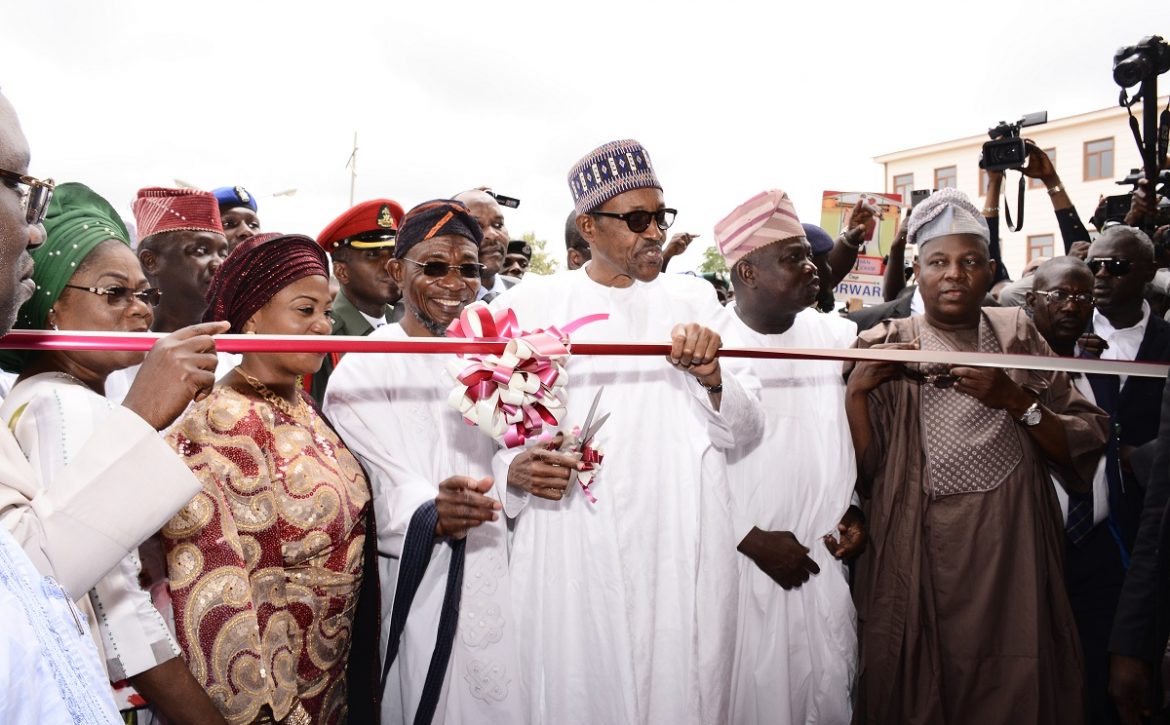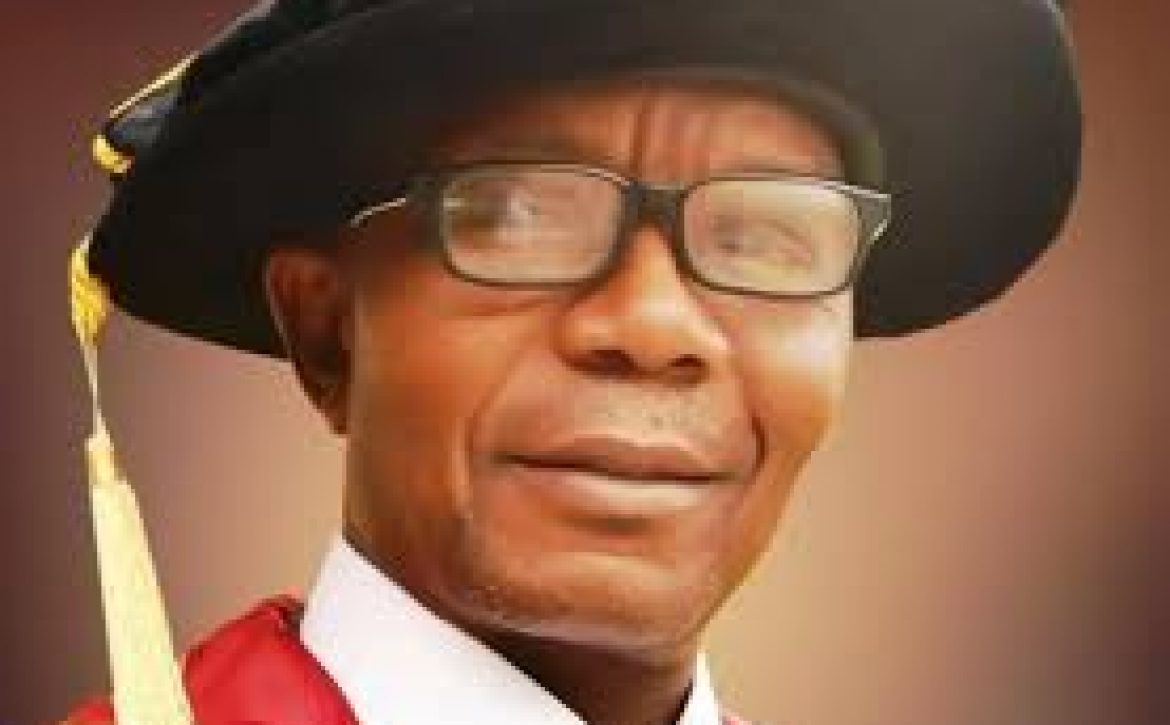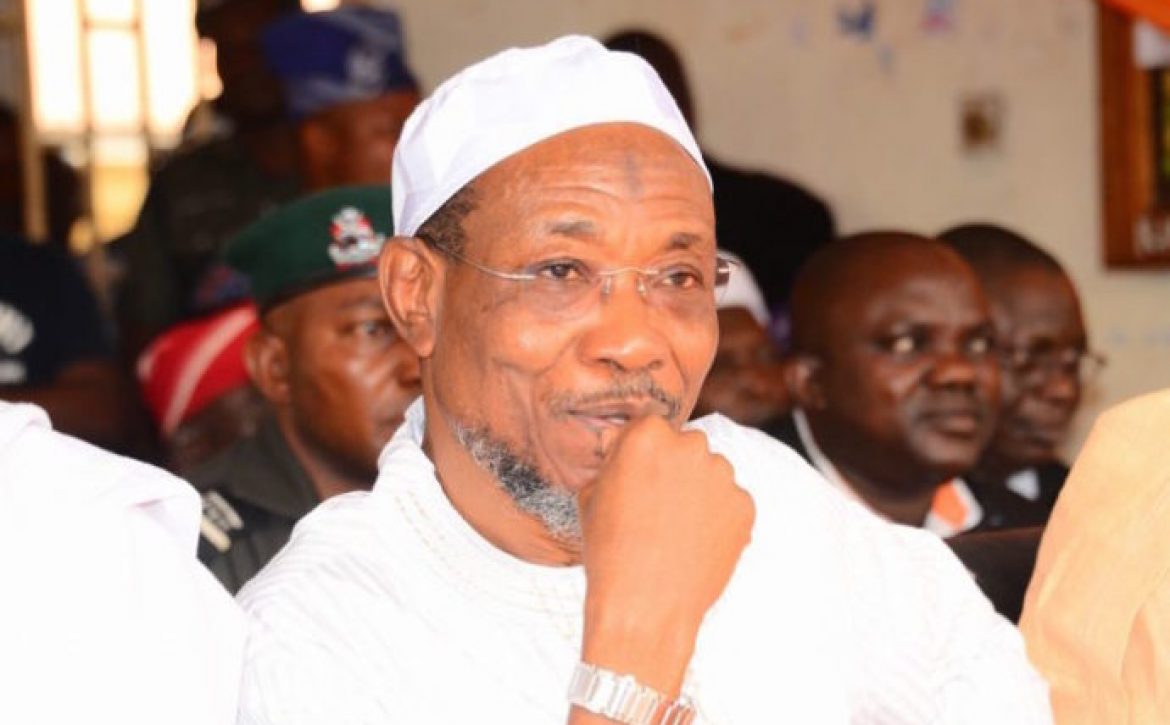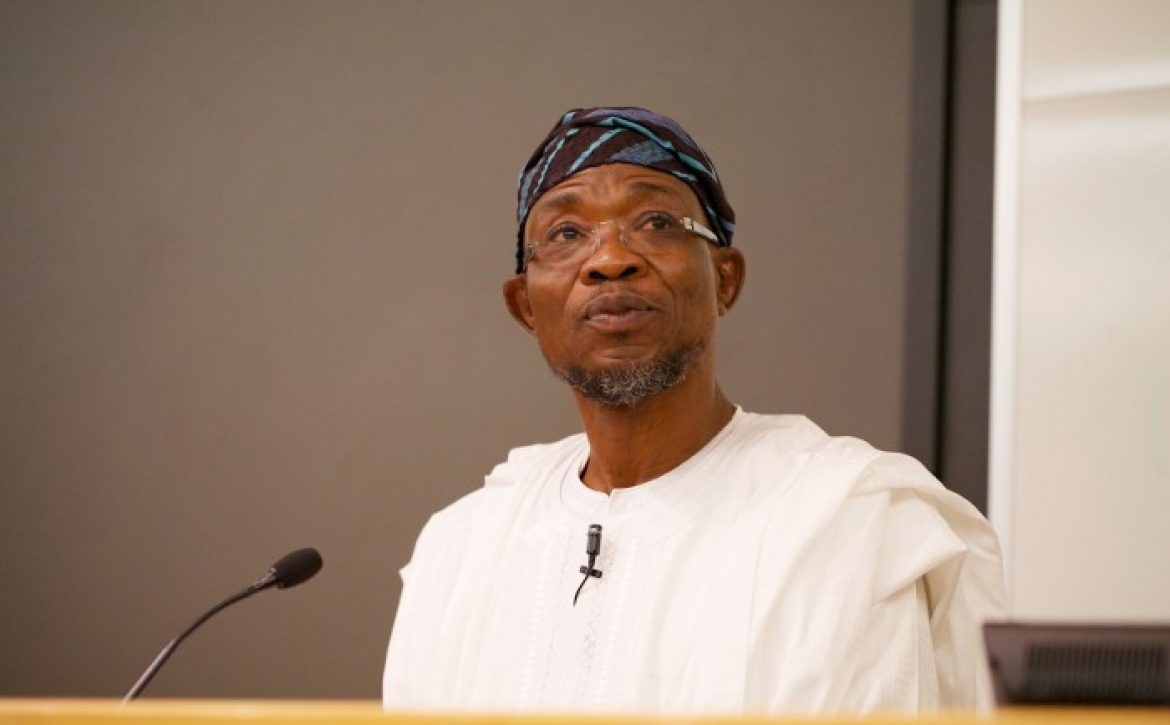As the State Government of Osun continues to make efforts towards getting education on a sound footing in the state, all is now set for the supplementary entrance examination into 4 of the new state of the art high schools across the state. The supplementary entrance exam is being conducted to further give opportunity to candidates who
claimed that they were not aware of the time the first exam was conducted and those who could not take part in the first exam as a result of late submission of their forms.

According to a statement signed by the Permanent Secretary, Ministry of Education, Science and Technology, Mr. Festus Olajide, the examinations into Osogbo Government High School, Wole Soyinka Government High School, Ejigbo, Adventist Government High School, Ede and Ataoja Government High School, Osogbo will hold at the school
premises tomorrow (Saturday 21st Jan 2017) in each of the high schools.
The statement urges students who have registered for the examination to be on seat at their various centres by 8:30 in the morning as the examination will start by 9 O’clock in the morning.
On September 1, all roads led to Osogbo, the Osun State capital. The occasion was part of the state’s celebration of the Silver Anniversary of its creation by the military president, General Ibrahim Babangida, on August 27, 1991, along with 11 other states, namely, Abia, Adamawa, Anambra, Delta, Edo, Enugu, Jigawa, Kebbi, Kogi, Taraba and Yobe. The significance of Osun State’s celebration lied, in part, in the fact that it was the only one President Muhammadu Buhari participated in.

The president’s participation was by way of visiting a couple of the state’s newly built primary and secondary schools before finally inaugurating the Osogbo Government High School. The school must be one of the largest, most beautiful and most well equipped secondary schools in the country.
Actually the school, as the governor, Ogbeni Rauf Aregbesola, explained in his welcoming address, is three-in-one, each with a student population of 1,000, its own principal and staff but with an overall supervising principal and sharing academic and sports facilities.
The high school may be top of the line, but it is only one of a dozen or so high schools that Governor Aregbesola has built or rebuilt as part of his comprehensive restructuring – today’s buzz word for every politician seeking relevance! – of primary and secondary school education in the state to give its students the quality education they need to transform their state from Third World status to First in one generation. (It reminds you, doesn’t it, of the famous title of the autobiography of Lee Kuan Yew, Singapore’s late prime minister, who lifted his country from Third World to First in one generation).

When Aregbesola first became the governor in November 2010, he inherited a public school system typical of public state system all over Nigeria – dilapidated, over populated, under staffed, under equipped, and badly managed schools. As a man who apparently believed the key to human progress is education, the governor resolved to end the rot.
As the man himself told it in his welcome speech on Thursday, the first step he took in ending the rot was to convene an education summit for the state chaired by no less an icon of the virtue of knowledge than Wole Soyinka, black Africa’s first Literature Nobel laureate.
Out of the summit emerged four elements for the transformation of the state’s public schools: their feeding and health programme, reclassification of the schools into elementary, middle and high schools, infrastructural development and the provision of what Americans call edtech (the use of technology to drive education), but which the state called Opon-Imo (Yoruba for tablet of knowledge) for all students.
The building of the high school President Buhari inaugurated last Thursday fell into the third category in which so far the Aregbesola administration has constructed or reconstructed 28 elementary schools, 22 middle schools and four high schools, with another 14 virtually completed.

Aregbesola was, of course, not the first to convene an educational summit. Long before him, the Northern Governors’ Forum did so in Kaduna. Individually the governors also made the right noises about ending their region’s notorious educational backwardness. To date their actions have not matched their noises. Instead, the region has dropped even further behind than it was during the First Republic.
Educationally backward as the North was back then, its leaders, with its premier, Sir Ahmadu Bello, in the forefront, walked their talk about bridging the gap between the region and the rest of the country. Meaning, they invested heavily in primary and secondary schools so that the region could produce quality materials qualified for admission into any tertiary institution anywhere in the world.
With all due humility, I can boast that I am one of those materials. I and my cousin, retired Major-General Mohammed Garba, and a childhood friend, Professor Mustapha Zubairu of Federal University of Technology, Minna, attended Native Authority primary schools in Kano, first in Tudun Wada for the first four years from 1957 and finished at Kuka Primary School after another four, having had to repeat my final year because I failed to gain entrance into a secondary school in my third year in 1963.
Kuka was located between Sabon Gari where we lived and Fagge. It was a walking distance from our home on Niger Road. All around us were Igbo and Yoruba most of whose children attended private and mission schools. In the evenings of weekdays all of us attended private lessons to improve on our chances of doing well in school. I remember we used to beat the children who went to private and mission schools in the evening classes, especially in English.
I am always amused each time people talk about the magic Chief Obafemi Awolowo performed with free education in Western Region. Of course, it was a great achievement which showed Awo’s foresight. Even then I am always amused because while the great premier of the West gave free education, in the North we were paid to go to school and we did so in hundreds of thousands, if not in millions.
The problem, I think, was that the next generation of the region’s politicians chose to pay only lip service to investment in education, especially primary and secondary education, without which invariably we could only send garbage into our tertiary schools. And as they say of computers: garbage in, garbage out.
I know this for sure because of the experience I had teaching in my alma mater, Ahmadu Bello University’s Mass Communication Department for six years until I left two years ago. During the last three of those six years, I made it a habit to test the English language of all my students, both under- and post-graduates, at the beginning of each semester.
The test was a simple one of correcting 10 sentences with errors in grammar, spelling and punctuation. The average failure rate for all the students was a dismal 70 per cent! The highest score was 8 and you could count those on your fingertips.
The conclusion is obvious; our universities have generally been taking in barely literate materials because our primary and secondary schools have suffered criminal neglect.
In giving primary and secondary education top priority to the extent of even borrowing to reform Osun State’s public education system, Aregbesola has demonstrated that he has his heart and mind in the right place. As a mutual friend, Chief Ikechi Emenike, who also witnessed Buhari’s inauguration of the Osogbo Government High School said, the governor’s educational intervention “reflected an abiding love for his people and a deep appreciation of history and his legacy.”
President Buhari summed it even better when he said in his speech the governor was only keeping the promise of the ruling party to provide free and qualitative basic education by implementing the Basic Education Act.
“What we are witnessing here today,” he said, “is the formal fulfilment of that promise in Osun by the state government. The cost effectiveness of this project can only be seen when we consider that this school will graduate an average 1,000 pupils in a year and in 50 years it would have produced 50,000 well trained and well equipped pupils, many of who will go to higher institutions and will form the backbone of the administration of our country.
Over six years ago, an award-winning columnist of the New York Times, Thomas Friedman, wrote an article which underscored the importance of quality basic education and which I have had cause to refer to on these pages and elsewhere. He titled it “ Pass the Books. Hold the Oil.”
It was published in the Times of March 10, 2012. Every politician concerned about the dismal state of our education at all levels should read that short – roughly 1,070 words – article. In it Friedman narrated how a study by rich-country club, the Organisation of Economic Cooperation and Development (O.E.C.D.), established a negative linkage between natural resource dependent countries and knowledge.
The club looked at the bi-annual test of 15-year olds in Mathematics, Science and reading comprehension in 65 countries and the total earnings of each of them as a percentage of its Gross Domestic Product. The test was called PISA, Programme for International Student Assessment.
The study, Friedman said, showed that the bigger a country’s revenue from natural resources as a percentage of its GDP, the poorer the knowledge and skills of its pupils. For example, participating Middle Eastern countries like Saudi Arabia, Kuwait, Oman, Algeria, Bahrain, Iran and Syria that were natural resource rich performed poorly compared to Lebanon, Jordan and Turkey, also in the Middle East, which were natural resource poor. So, Friedman concluded, “Oil and PISA don’t mix.”
As always there were exceptions to his thesis. Canada, Australia and Norway, also countries with high levels of natural resources, he pointed out, still scored well on PISA, in large part because all three countries had established deliberate policies of saving and investing these resource rents, and not just consuming them.
The three countries provide great lessons for us as a natural resource dependent country by showing that oil and PISA can indeed mix.
As a country we may have so far blown away our oil fortune, but clearly Aregbesola has shown as governor of one of the poorest states in the country that you don’t have to be rich to plan for the future of your children.
The Visitor to the Osun State University and Governor of Osun, Ogbeni Rauf Aregbesola, has approved the appointment of Prof Labode Popoola as the new Vice Chancellor of the University.

The appointment follows the recommendation by the Council of the institution which was signed and forwarded to the Visitor by the Pro-Chancellor and Chairman of the Council, Yusuf Ali (SAN) after considering the report of the Selection Board.
The Appointment takes effect immediately.
Governor Rauf Aregbesola of Osun has explained that the need to produce the total man who is useful to his society remains the rationale behind his administration’s huge investment in education in the state.

The governor said whatever is invested in education is for the future adding that his government has embarked on massive construction of classrooms, reforms of the schools system, provision of other modern learning tools and others for the good of the state’s future.
Speaking at the public presentation of a book titled: The Heritage of Islam in Nigeria: Essays in Memory of Dr. Dawood Adekilekun Tijani on Saturday in Ede, Aregbesola said scholarship does not die as he noted that the huge investment in education in the defunct Western region by the late Chief Obafemi Awolowo culminated in the Western part of Nigeria having the edge it had over other parts of the country.
Aregbesola, who was represented by the Director, Bureau of Communication and Strategy, Office of the Governor, Mr. Semiu Okanlawon, said, “Scholarship does not die. Erudition does not perish and handwork does not fade away.”
The governor said the late scholar, Dawood Adekilekun Tijani, who was being honored with the book of essays on Saturday had invested energy on education, adding that this is why he is still being celebrated many years after he had departed.
“Through scholarship, the late Dr. Adekilekun Tijani was able to touch lives. Those whose lives were touched by his investment in education are today touching other lives. The lesson here for us today is that we should all endeavour to touch lives and education remains the best way to do this,” Aregbesola said
The governor said that a man taken out of ignorance has been given his weapon against poverty adding that this is the reason for his government’s heavy investment in education.
He said, “ I must state that this is the major reason functional education remains our biggest investment. A man that is knowledgeable is a man that is wealthy. And in a knowledge-based society and economy that we are advocating, functional education is the only way to be relevant and be in position to play a role.
Others present at the public presentation include the Timi of Ede, Oba Muniru Adesola Laval, former Governor of the state and senator representing Osun West senatorial district, Isiaka Adeleke, who was represented by Alhaji Olumide Laval, Speaker House of Assembly, Najeem Salam, who was represented by his media aide, Goke Butika, National Commissioner Public Complaints Commission, Prof Aderemi Abubakre, Vice Chancellor Ladoke Akintola University of Science and Technology, Prof Adenine Gbadegesin, former Commissioner for Special Duties and Regional Integration, Dr. Bashir Ajibola and others.
Mrs Olubunmi Ayoola, Programme officer of the Osun Elementary School Feeding and Health Programme (O’MEAL), says the free meal programme in the state has boosted enrolment of pupils in public schools.
Ayoola spoke on Friday in Osogbo while receiving a delegation from Niger State on a three-day visit to understudy the O’MEAL programme of the state.

She said that the Gov. Rauf Aregbesola-led administration in the state would continue to implement the feeding programme in spite of the scarce financial resources available to the state.
“Through this programme, there has been a relative increase in pupils’ enrollment in the state public schools,’’ Ayoola said.
She said that the programme also impacted positively on the state’s economy as food vendors and farmers were empowered in the process.
In her remarks, Mrs Afiniki Dauda, Special Adviser to Niger State Governor on Empowerment and Social Protection, who led the delegation, commended Gov. Aregbesola for the programme.
She said that the programme showed the commitment of the Aregbesola-led administration to the welfare of the people of the state despite the financial crisis affecting most states.
Dauda said Osun state was a model to all other states of the federation in the area of O’MEAL.
According to her, Niger will take a cue from Osun to run a similar programme.
NAN
The free feeding and health programmes introduced by the Osun State government to encourage school enrolment, attendance and rate as well as enhance pupils’ health has not only become a model for the federal and state governments, but also a platform for agricultural development and food production. SINA FADARE reports.

At the onset, the primary objectives of the free school feeding programme introduced by the Osun State government was aimed at increasing school enrolment, encourage attendance as well as enhance pupils’ health in all public primary schools.
Farmers appear to be the major beneficiaries of the programme as they embarked on massive food production as well as having ready market for their produce.
The programme has also enhanced the income of local farmers; thus reducing poverty level as all goods are sourced locally.
On weekly basis, no fewer than 40 herds of cattle; 10,000 crates of eggs; 20,000 chickens, over 400 metric tons of fish are needed to feed the pupils.
About 500 unemployed youths were trained and empowered for mass fish production under Osun Fisheries Out-Growers Production Scheme (OFOPS).
The scheme supplies well over 400 metric tons of fish regularly for the school feeding while cultivation of cocoyam through a cocoyam rebirth programme was also encouraged.
Over 1,000 cocoyam farmers (selected across the nine federal constituencies) were trained and assisted to mass cultivate pink cocoyam for inclusion in the school feeding menu.
Today, the number has risen to over 15,000, as more women and young adults have taken to farming; cultivating cocoyam, vegetables, tomatoes and melon.The programme, which began in 2006, has become a success story and indeed a reference model for many states and countries as pupils from kindergarten to primary four in public primary schools are fed daily with balanced foods such as fish, meat, vegetables and fruits that are rich in protein.
The pupils are de-wormed twice a year. A comprehensive menu which, among other things, would help to develop the brain capacities of the growing children in their formative years was drawn up by stakeholders in the education sector.
The team argued that a well-fed pupil is likely to be healthy and more attentive in class than those on empty stomach.
Addressing delegates from all the states of the federation, including the Federal Capital Territory (FCT) on the school feeding programme, Osun State Deputy Governor, who doubles as the Commissioner for Education under whose supervision the school feeding is carried out, Mrs. Grace Titilayo Laoye-Tomori noted that the programme began in 2006 as one of the 13 pilot states (Federal Capital Territory, Abuja, inclusive).
She explained that the Aregbesola-led administration extended the beneficiaries of the school feeding programme in 2012 to primary four pupils and rechristened it Osun School Feeding and Health Programme (O-Meals).
Mrs. Laoye-Tomori maintained that the free meals in public schools has led to sharp increase in enrolment from 155,318 to 194,253 after four weeks of its implementation, saying that currently over 252,000 pupils are being fed while they remain in school until closing time.
She said: “According to the Federal Bureau of Statistics Report of 2013, Osun State has the highest primary school enrolment rate in the country and the lowest number of children of school age being out of school.”
Mrs. Laoye-Tomori said that through the programme, the state was able to capture the actual figures of school pupils being fed under the programme which costs the government the sum of N18 million a week.She said a total of 3,007 food vendors were engaged, trained, kitted with uniforms and made to undergo medical screening.
The vendors, according to her, were given loans to procure cooking utensils and organised into 124 functional co-operative investment and credit societies for effective administrative purposes.
Mrs. Laoye-Tomori noted that the success of the programme has attracted compliments and accolades from both local and international forums.
In 2014, the British Parliament invited the Governor Rauf Aregbesola to talk on the implementation of the school feeding programme for which the Parliament praised him.
She explained that commendation also turned in from government of South Africa which sponsored her visit to the country.
While praising the delegates for the visit to have a requisite insight into the dynamics of the school feeding programme, Mrs. Laoye-Tomori advised them to sit back and fashion out what will work for their respective states and people.
The Governor of Osun State, Ogbeni Rauf Aregbesola, on Thursday ordered the authorities of the state College of Education, Ilesa to henceforth put a stop to organising combined graduation ceremonies in the school.

Aregbesola ordered that all outstanding graduation programmes of the institution must be done before the end of 2017.
He said the remaining programmes must be concluded in two batches before December 2017.
The governor gave the charge while speaking at the combined 24th graduation ceremony of four sets of 6,600 graduating students at the auditorium of the College in Ilesa.
He appealed to the students of the college not to disrupt the academic programmes of the institution so as to meet up with the set target.
He said: “Combined graduation ceremony must not happen in this school again.
“This graduation ceremony I believe is for the sets of 2007 to 2011.
“It is too much and not good enough.
“The graduation ceremonies of the set of graduands between 2012 to 2016, which will be the 25th graduation ceremony must be done in two batches before December 2017.
“I implore the students of this great institution not to disrupt the academic programmes of this school so as to meet up with the set target.”
Speaking on the various interventions of government in the education sector, Aregbesola said it was occasioned by the education summit chaired by Prof. Wole Soyinka, which gave some recommendations that government is implementing to improve academic performance in the state.
He said the summit also brought about the O-MEALS programme, which has been a huge success, hence making the Federal Government to adopt the programme.
He explained that the O-MEALS programme has created employment opportunities for different individuals in the state as well as boosting Agricultural sector in the state.
The Governor also used the occasion to shed light on the restructuring of the state’s tertiary institutions.
Aregbesola said it is not meant to scrap any school or retrench workers but to make the schools more relevant through the offering of vocational trainings and provision of remedial courses for young school leavers.
While congratulating the new graduates, the Governor said graduating from an institution is an accomplishment which prepares them for later life accomplishments.
He urged those who will be going directly into teaching to see it as an opportunity to give back to the society through teaching morals as well as trying to improve the academic qualities of the younger generation.
He said: “We are determined to improve the standard of education in our state.
“That is why we are spending so much in building state-of-the-art education facilities across the state.
“That is why we are spending so much feeding our pupils in elementary schools through the O-MEALS programme, which has attracted interests from all over the world to the extent that the Federal Government has adopted it.
“Our vision to restructure our state institutions is not to scrap any school or retrench workers, but we want to make the schools more attractive to the world.
“We want them to be able to offer remedial courses to young school leavers and provide vocational training to people in the society.”
In his graduation address, the Provost of the institution, Dr. Kadri Adegoke, explained that the ceremony is being used to reward excellence and hard work through the award of prizes to graduating students who have performed outstandingly well.
Adegoke said the programme is also used to honour two eminent Nigerians because it is believed that it will help in stimulating the spirit and culture of hard work, enterprise and excellence in the graduating students.
The provost used the occasion to express gratitude to the administration of Aregbesola for assisting the institution in giving capacity development to its staff, saying the college has never had it so good.
According to the provost: “This graduation ceremony is a combination of four sets of between 2007 to 2011, making a total of 6,600 graduands.
“We are using this ceremony to award excellence and hard work by awarding prizes to graduands who have performed outstandingly well.
“This occasion is also being used to honour eminent Nigerians in the presence of the graduands because we want it to serve as stimulant to the students and make them to be hardworking and become great enterpreneurs in future.
“I thank the Ogbeni Aregbesola administration for assisting the school in capacity building of the members of staff of this school, our college have never had it so good under any administration in this state.
“Almost all our academic staff members and some non-teaching staff members were sponsored on international conferences in the U.S. and the U.K in the last four years.
Delivering an acceptance speech on behalf of himself and a retired Justice of the Supreme Court, Justice Bola Babalakin, a legal luminary, Chief Adegboyega Awomolo, who was presented honourary awards alongside Babalakin, stated that education is one of the cardinal objectives of the All Progressives Congress government.
Awomolo described Aregbesola as a visionary governor who is pursuing his objective of taking Osun State to a great height in terms of academic performance, noting that education as a sector should not be handled with kids glove by any government.








